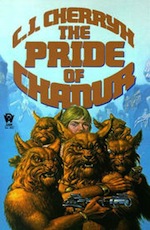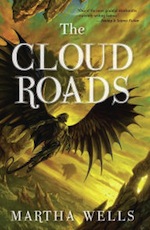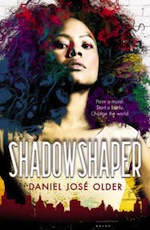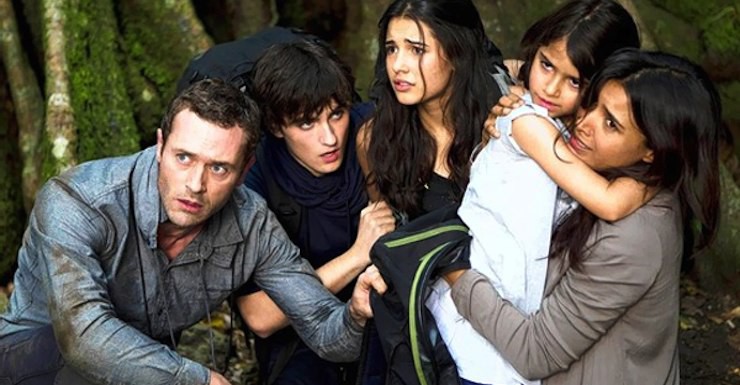The main character who is orphaned or has no significant contact with family (left behind, estranged, dead spouse or child as motivator, etc) shows up frequently in SFF novels, and understandably so: Such characters don’t have to take anyone else’s life or needs into account as their adventures unfold. It’s easy to just pick up and go when you don’t have anyone relying on you, or when your decisions don’t immediately impact the lives of people you care about.
I’ve written this kind of character myself, but with Court of Fives I specifically wanted to write a story in which the main character’s family is intact and present, and therefore plays a part as one of the complicating factors in her journey. What happens when a choice we need to make will hurt someone we care about? How much will we risk for those we love?
Here are five SFF stories complicated by the presence of intact and present family relationships.
The Pride of Chanur series by C.J. Cherryh
 A classic SF series from the 1980s that centers on a pride of lion-like humanoids, their trading business, and the trouble they run into and deal with in a corner of the galaxy filled with interesting alien species. The Compact is a fantastic piece of sfnal world building on its own, but the Chanur themselves hold a special place in my heart because the crew is (initially) all female given that EVERYONE KNOWS males are too unstable, emotional, and volatile to be good merchants. Considering how often as a teen and young adult I had to hear that women couldn’t do man-stuff-things because females were too emotional and unstable, you may imagine how much I enjoyed reading this when it came out. Once again I’m reminded what a toweringly creative and innovative figure Cherryh is in our field and what an influence she had on me as a writer.
A classic SF series from the 1980s that centers on a pride of lion-like humanoids, their trading business, and the trouble they run into and deal with in a corner of the galaxy filled with interesting alien species. The Compact is a fantastic piece of sfnal world building on its own, but the Chanur themselves hold a special place in my heart because the crew is (initially) all female given that EVERYONE KNOWS males are too unstable, emotional, and volatile to be good merchants. Considering how often as a teen and young adult I had to hear that women couldn’t do man-stuff-things because females were too emotional and unstable, you may imagine how much I enjoyed reading this when it came out. Once again I’m reminded what a toweringly creative and innovative figure Cherryh is in our field and what an influence she had on me as a writer.
Martha Wells’ Raksura stories
 Moon is alone in the world, a person without a past, clinging to dim memories of his dead mother and siblings. For years he has survived as well as he can, hiding his shape-shifting ability, trying to fit in . . . until the day a stranger finds him and recognizes what he really is. Besides the absolutely fantastic world building in this series, Moon’s journey of discovery detailing the kinship and friendship relationships he has to learn to understand and cope with is just unendingly delightful because Wells never loses sight of how complicated interpersonal connections are far harder for Moon to figure out and endure than basic survival. I love this series so much.
Moon is alone in the world, a person without a past, clinging to dim memories of his dead mother and siblings. For years he has survived as well as he can, hiding his shape-shifting ability, trying to fit in . . . until the day a stranger finds him and recognizes what he really is. Besides the absolutely fantastic world building in this series, Moon’s journey of discovery detailing the kinship and friendship relationships he has to learn to understand and cope with is just unendingly delightful because Wells never loses sight of how complicated interpersonal connections are far harder for Moon to figure out and endure than basic survival. I love this series so much.
Terra Nova
I didn’t think this 2011 series was great TV but it was often good and I liked it a lot (I never get tired of dinosaurs!), so I was sorry to see it canceled. I particularly loved that the story was built around the Shannon family and how their choices initially are driven by their desire to keep their family intact, and then later adapts to show them negotiating their changed circumstances without needing to artificially split them apart for “dramatic” reasons. As we watched Season One both my spouse and I discussed how unusual such a narrative choice seems in sff shows which are often dependent on people who function in isolation or with so few ties they apparently have no life outside their job, or within dysfunctional or absent or negative and combative family environments. I genuinely enjoyed seeing a loving, supportive family at the center of a series.
Michelle Sagara’s The Queen of the Dead Trilogy
 Few writers evoke the push and pull of family affection, duty, and loyalty as well as Sagara. This YA trilogy about a girl who discovers she can see and speak to ghosts builds such a powerful emotional punch that it made me cry more than once, and succeeded in getting me so wound up with tension that during one particularly fraught scene I had to stand up and walk around because I was shaking with anxiety. The bonds of family and friendship really shine in these books: People love each other, misunderstand each other, get exasperated and then apologize; they back each other up; they risk their lives out of compassion because it is the only way they know how to act and they do so in ways that never, ever, feel trite or easy. I guess I could say that this trilogy is about the ties that bind us, the very definition of how intact family relationships impact our lives.
Few writers evoke the push and pull of family affection, duty, and loyalty as well as Sagara. This YA trilogy about a girl who discovers she can see and speak to ghosts builds such a powerful emotional punch that it made me cry more than once, and succeeded in getting me so wound up with tension that during one particularly fraught scene I had to stand up and walk around because I was shaking with anxiety. The bonds of family and friendship really shine in these books: People love each other, misunderstand each other, get exasperated and then apologize; they back each other up; they risk their lives out of compassion because it is the only way they know how to act and they do so in ways that never, ever, feel trite or easy. I guess I could say that this trilogy is about the ties that bind us, the very definition of how intact family relationships impact our lives.
Shadowshaper by Daniel José Older
 This new (2015) YA urban fantasy novel is set in modern Brooklyn and does a fantastic job of creating the rhythm of those streets in a way that feels utterly real to me as a reader. As well, he provides a stellar example of how extended kinship relationships can be used to underpin and complicate a plot. Main character Sierra lives with her mother, father, and (invalid) grandfather; her brothers are grown up and out of the house but not out of the picture; she has important connections (sometimes positive, sometimes negative) to her aunt and godfather as well as to those of her relatives who have passed on; she hangs out with a believable circle of friends. As a budding artist, Sierra discovers a secret history of powerful forces that has been hidden from her, and how she has both a gift and a responsibility to carry on a tradition. Older never loses sight of how the past still works in the present.
This new (2015) YA urban fantasy novel is set in modern Brooklyn and does a fantastic job of creating the rhythm of those streets in a way that feels utterly real to me as a reader. As well, he provides a stellar example of how extended kinship relationships can be used to underpin and complicate a plot. Main character Sierra lives with her mother, father, and (invalid) grandfather; her brothers are grown up and out of the house but not out of the picture; she has important connections (sometimes positive, sometimes negative) to her aunt and godfather as well as to those of her relatives who have passed on; she hangs out with a believable circle of friends. As a budding artist, Sierra discovers a secret history of powerful forces that has been hidden from her, and how she has both a gift and a responsibility to carry on a tradition. Older never loses sight of how the past still works in the present.
Intact family relationships can heighten drama as well as create a more believable character landscape. Our connections to others define us in important ways, and I for one adore books that highlight this aspect of humanity.
Kate Elliott has been writing stories since she was nine years old, which has led her to believe that writing, like breathing, keeps her alive. Her first young adult novel, Court of Fives, is available August 18th from Little, Brown Books for Young Readers.











Dare I say – Zelanzy’s Amber series. Even after some losses, more brothers and sisters than you can shake a stick at.
Do clone brothers count? Because if so, the Vorkosigan saga.
@2 and don’t forget “idiot” cousin Ivan as well.
I’d say DUNE but the Atreides and Harkonnens are somewhat dysfunctional.
Thanks for this list! I haven’t read any of the books here (‘though I liked Terra Nova, too) and will certainly seek them out.
If clones count, then we have to mention Orphan Black, which is all about family. The kind you’re born into, the kind you make, and the kind you didn’t know about.
Also Fullmetal Alchemist. On one hand, Ed and Al are on their own throughout the story, but their father and mother both play critical (and ongoing) roles in their entire lives –the entire series is bookended by family photos; Ed & Al as children with their parents, then as adults with their own wives and children.
I would add Gravity Falls – especially post portal opening. And Steven Universe!
Walter Jon Williams’ Aristoi.
Gabriel is a ruler of several solar systems, armed withthe power to create and shape planets using advanced nanotech. To his people, he is almost a god – revered and celebrated.
He also has a mother who’s still alive.
And mom needs something to do. so mom runs a church in which her own son is a god – against his iown wishes. She also calls him every so often, with the usual passive-agressive complaints (you never call, etc). I found it hilarious.
Does this one count? It’s not completely intact, but one of the core themes of DS9 was that Sisko had to think about families living on his station, and how his decisions would affect them.
In Miller and Lee’s Liaden books, nothing is important as family except possibly the honor of one’s family. I love that about them. There’s a powerful scene where a man who thought his family dead is reunited with his cousin, and it kills me every time.
shellywb@10,
I see that you’re a Pat Rin fan too!
YAY, thank-you for remembering the Chanur series; that was my summer re-re-re-re-read. I would pay good money to see that made into a film; CJ Cherryh really does difficult relationships well.
Kate, wanted to let you know how much I LOVED Court of Fives. The family relationships are great, the female characters are amazing and..I just loved it! It’s definitely my favorite book of the year so far. My only complaint is that I read it too soon and have to wait even longer for the sequel.
I watched Terra Nova with my kids and the family part of the show was good. This trend of protagonists with no families is so strange, how many readers actually identify with that?
The Goblin Emperor is largely concerned with family, too, although not the standard nuclear parents-and-kids kind.
If you haven’t read it, I’d guess you’d really like The Raven Boys. Each of the characters has a family that’s unique, present, and has a different impact on their family member. The functionality/dysfunctionality runs from very functional to very dysfunctional, and includes plenty of examples in the middle.
@2 and @3: and not just brothers and cousins. The Vorkosigan books are also full of parents being parents– not perfect always, but loving and supportive and there for their kids.
For that matter, Cousin Ivan’s life becomes distinctly more complicated when he becomes entangled with his wife’s extremely close if slightly criminal family.
While we’re on the subject of parents, there’s also Brian Vaughn’s Saga saga. It’s not every story where the action-adventure heroes are also the parents of a very young baby, and with a bonus pair of action-adventure grandparents thrown in.
@11, I love Pat Rin. He’s the heart of the series for me. Val Con is fun and tragic and quite the hero, but Pat Rin is a fairly average guy for a Liaden, with above average style and guts, and he rises above it all for his family. His story is amazing.
Caught in Crystal by Patricia Wrede is often described as “one woman’s search for a good baby-sitter.” It’s heroic fantasy about a woman with a couple of children — and she takes them with on her adventure, because it’s not as if she has anywhere else to park them.
Kirstein’s Steerswoman books have several interesting takes on this – the Steerswomen and -men are more like the usual detached SF protagonist but the guild has become their family of choice. The Outskirters are very much connected to family and clan, and I have mentioned here before the moving lineage recitation scene in The Outskirter’s Secret (“and Damita was first”).
I add a voice of approval for the Martha Wells Raksura books. The Cloud Roads hooked me on the first page. Brilliant series.
@11 and @17 – Pat Rin’s story is my favorite of the Liaden books as well.
These are great examples. Thanks for all of them (even the dysfunctional Dune families… )
I’ve read and really enjoyed the early Liaden books and some (but not all) of the Vorkosigan novels.
19. brightglance Complete agreement about The Outskirter’s Secret — I love that series and that volume in particular, and agree about the lineage recitation. Stunning stuff.
9. Eddie: Yes! DS9 is my favorite Trek in large part because of the importance of family. The Siskos are a fantastic example of how the presence of family can drive complex plot, and of course I love the O’Briens as well although I don’t think they were used as well as Jake and his dad and grand-dad. There are lot of iterations of family on that show.
13. brightbetween Thank you so much! I really appreciate your kind words and I’m so glad you enjoyed it.
If it helps, I’m revising book 2 now and it is on pace for publication next August. Although now that you point it out, that seems like quite a long ways away.
Dianna Wynne Jones often has great families- in The Dark Lord of Derkholm, the protagonist’s wife and many children (both human and genetically engineered griffons) have to work together to help him become the dark lord.
In Patricia Wrede’s 13th Child, the main character has 12 siblings, although she’s mostly concerned with her relationship with her twin.
A Fistful of Sky by Nina Kiriki Hoffman is about sibling rivalry and power dynamics.
Jo Walton’s My Real Children has two families at the center in two alternate universes- one version where she has an abusive husband and four children and another where she’s in a long term lesbian relationship and has three children.
I think the few sff books where the character isn’t an orphan (or the child of extremely dysfunctional single parents) are ABOUT family (as opposed to mimetic fiction where everyone just happens to have a family).
I’d add Tom Mason, his boys and second wife [and their child] from ‘Falling Skies’.